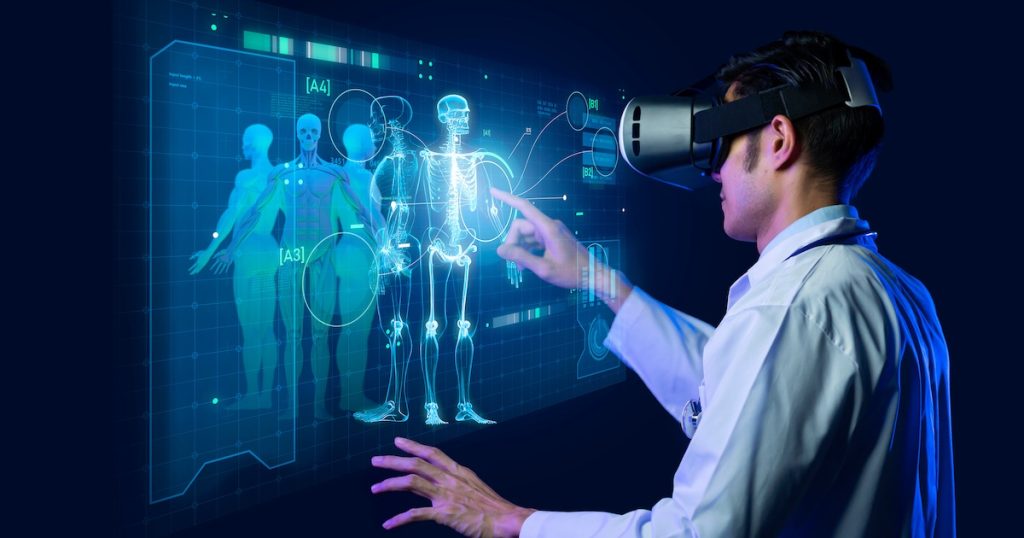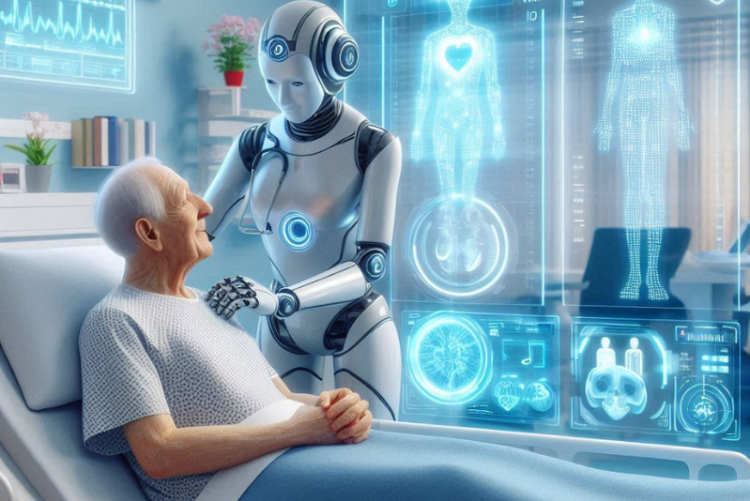Introduction
Artificial intelligence (AI) is rapidly transforming a wide array of industries, and perhaps nowhere is this transformation more pronounced than in the healthcare sector. With its ability to analyze vast amounts of data, detect patterns, and assist in decision-making, AI is poised to revolutionize medical diagnostics, personalized treatment, drug discovery, patient care, and hospital management. AI’s integration into healthcare is a game-changer, offering the potential for significant improvements in the accuracy, efficiency, and accessibility of medical services.
This article explores how AI is reshaping healthcare, from clinical practices to administrative functions. We will delve into specific applications, the benefits and challenges associated with AI adoption, ethical considerations, and the future outlook for AI in healthcare.
1. AI in Medical Diagnostics: Revolutionizing Early Detection
AI-Driven Diagnostics: A New Era in Healthcare
One of the most promising applications of AI in healthcare is in medical diagnostics. The ability to quickly and accurately diagnose diseases is fundamental to improving patient outcomes. Traditional diagnostic methods, although effective, often rely on the expertise of individual clinicians and can be subject to human error or limitations. AI, with its data-driven approach, can process vast quantities of medical data from diverse sources—such as patient records, lab results, and medical imaging—enabling more precise and timely diagnoses.
AI is already making substantial inroads in diagnostic fields such as radiology, pathology, and dermatology, where early detection is crucial. By analyzing medical images, AI algorithms can identify anomalies such as tumors, fractures, and other abnormalities with a level of precision that rivals or even surpasses human clinicians in some cases.
Applications in Medical Imaging
- Radiology: AI has shown immense promise in analyzing radiological images like X-rays, CT scans, and MRIs. For example, AI-powered tools like Google Health’s AI model have demonstrated the ability to detect breast cancer in mammograms with a higher level of accuracy than radiologists. These tools use machine learning algorithms to detect patterns and subtle irregularities in imaging data that may go unnoticed by the human eye.
- Dermatology: AI models are increasingly used to analyze skin lesions for signs of melanoma, a type of skin cancer. AI-based applications can assist dermatologists by providing second opinions or flagging suspicious lesions for further investigation.
- Pathology: AI is enhancing the capabilities of pathologists by automating the analysis of biopsy samples. Through the use of deep learning, AI can help identify cancer cells or other abnormalities more quickly and accurately, enabling early intervention.
The Promise of AI for Early Diagnosis
Early detection of diseases, especially cancers and neurological disorders, can dramatically improve treatment outcomes. AI models, trained on large datasets of medical images and patient histories, are capable of identifying early signs of disease that might be too subtle for human clinicians to detect. For example, in oncology, AI tools can identify small nodules in lung CT scans that could indicate early-stage lung cancer. Detecting such conditions early improves the chances of successful treatment, making AI an invaluable tool in preventive healthcare.
2. Personalized Medicine: Tailoring Treatments to Individual Needs
AI’s Role in Precision Medicine
Personalized or precision medicine involves tailoring medical treatments to individual patients based on their unique genetic, environmental, and lifestyle factors. AI has the potential to significantly enhance personalized healthcare by integrating data from diverse sources, including genomics, clinical trials, and patient medical records, to identify the best treatment options for a specific patient.
AI algorithms can analyze genetic sequences and identify patterns that may predict how a patient will respond to a particular drug or treatment. By analyzing genomic data, AI can assist in identifying mutations that may lead to diseases like cancer, thereby enabling more effective treatment strategies.
Predicting Drug Responses with AI
Pharmacogenomics, the study of how genes affect a person’s response to drugs, is a growing area of research in which AI is making substantial contributions. AI can help predict how an individual will respond to a given drug based on their genetic profile, reducing the risk of adverse drug reactions and increasing the effectiveness of treatments. By integrating genomic data with other health information, AI models can provide a comprehensive understanding of how to treat diseases on a highly individualized basis.
For example, in cancer treatment, AI can analyze a patient’s tumor profile and predict which targeted therapies are most likely to be effective. In doing so, it moves healthcare beyond the one-size-fits-all approach to a more tailored and effective treatment methodology.

3. AI in Drug Discovery: Accelerating the Path to New Treatments
The Traditional Drug Discovery Process and Its Challenges
The traditional drug discovery process is long, costly, and highly complex. It typically takes 10–15 years and billions of dollars to develop a new drug, with the success rate being relatively low. Early stages often involve high attrition rates, as many compounds fail to show therapeutic efficacy or exhibit unforeseen side effects.
AI, however, is accelerating this process by identifying potential drug candidates much more quickly and accurately than traditional methods. AI can analyze vast datasets from clinical trials, medical literature, and experimental research to predict which compounds have the highest probability of success. By using machine learning algorithms, AI can screen millions of molecules in a fraction of the time it would take a human researcher to do the same.
AI in Drug Repurposing
AI is also being used in drug repurposing, a process in which existing drugs are tested for new therapeutic uses. AI can rapidly identify potential new uses for existing drugs by analyzing large-scale datasets of patient health records, clinical trial results, and genetic information. For example, during the COVID-19 pandemic, AI models were used to quickly identify existing medications that could potentially treat the disease, speeding up the drug discovery process and saving valuable time in addressing the global crisis.
AI-Powered Predictive Models in Drug Design
AI is also being used in molecular design to create novel drug candidates. By simulating the interactions between molecules and biological targets, AI can predict how new compounds will behave in the body. This can reduce the need for costly and time-consuming laboratory experiments. For instance, AI models like DeepMind’s AlphaFold have made significant advances in predicting the 3D structures of proteins, a critical step in designing drugs that target specific biological processes.
4. AI in Patient Care: Improving Treatment and Monitoring
AI for Virtual Health Assistants
Virtual health assistants powered by AI are becoming a significant tool in patient care. These assistants can provide patients with personalized health advice, help them track their health metrics, and even provide reminders for medication schedules. For example, apps like Ada Health and Babylon Health allow users to input their symptoms, and AI algorithms analyze the data to provide potential diagnoses or direct users to appropriate care.
These AI-powered tools offer a significant advantage in terms of accessibility, particularly for patients in remote or underserved areas, where access to healthcare professionals may be limited. Furthermore, AI can ensure that patients adhere to treatment regimens by sending reminders and monitoring progress over time.
AI in Remote Patient Monitoring
AI is also transforming the field of remote patient monitoring. By collecting and analyzing real-time data from wearable devices, AI can track patients’ vital signs, such as heart rate, blood pressure, and glucose levels, and detect early signs of complications. This continuous monitoring allows for proactive care and helps prevent hospitalization by identifying issues before they become critical.
For instance, AI models can track the progression of chronic diseases like diabetes or heart disease by analyzing data from continuous glucose monitors or heart rate sensors. When abnormalities are detected, AI can alert healthcare providers, enabling timely intervention.
Robotic Surgery
AI-driven robotic systems are becoming increasingly common in surgical settings. These systems can assist surgeons by offering enhanced precision, reducing human error, and enabling minimally invasive procedures. Robots like Da Vinci or Mako use AI to analyze patient data and provide real-time feedback during surgery. These AI systems enhance the surgeon’s abilities, improving outcomes and reducing recovery times for patients.
5. Healthcare Administration: AI’s Impact on Efficiency and Cost Reduction
AI for Hospital Management
AI is also revolutionizing healthcare administration by streamlining hospital management processes. AI systems are being used to optimize staff scheduling, predict patient admissions, and even automate billing and insurance claims. By analyzing historical data, AI can predict peak times for hospital admissions, allowing hospitals to allocate resources more effectively and reduce wait times for patients.
AI for Fraud Detection and Billing
AI is increasingly being used to detect fraud in healthcare, such as overbilling, improper claims, and unnecessary treatments. By analyzing large datasets of billing information, AI algorithms can identify inconsistencies and flag potentially fraudulent claims, reducing financial losses for healthcare providers and insurers.
6. Challenges and Ethical Considerations in AI Adoption in Healthcare
Data Privacy and Security
One of the biggest challenges in adopting AI in healthcare is ensuring the privacy and security of patient data. Medical records and health-related data are highly sensitive, and AI systems require access to large amounts of personal information to function effectively. Securing this data against cyberattacks and ensuring compliance with regulations like HIPAA (Health Insurance Portability and Accountability Act) is a major concern.
Bias in AI Models
AI systems are only as good as the data they are trained on. If the data used to train AI models is biased or unrepresentative of certain demographic groups, the AI’s predictions and recommendations may be flawed. For example, an AI system trained primarily on data from white, middle-aged men may not perform as well for women or individuals from minority ethnic backgrounds. Addressing bias in AI healthcare applications is critical to ensuring equitable and fair treatment for all patients.
Regulation and Accountability
As AI systems become more integrated into healthcare, questions about regulation and accountability arise. Who is responsible when an AI system makes a wrong diagnosis or recommendation? How can we ensure that AI-driven healthcare applications meet the same standards of care as human clinicians? Developing clear regulatory frameworks for AI in healthcare will be essential to ensuring patient safety and fostering trust in these technologies.
7. The Future of AI in Healthcare
Expanding AI Applications
Looking ahead, the applications of AI in healthcare are expected to expand significantly. Beyond diagnostics, AI will continue to drive innovations in areas like personalized medicine, mental health, and elderly care. AI-powered solutions will further integrate into daily healthcare practices, making care more precise, efficient, and accessible.
Collaboration between Humans and AI
Rather than replacing healthcare professionals, AI will augment the abilities of clinicians, enabling them to focus on the most complex and nuanced aspects of patient care. As AI continues to evolve, we can expect to see a collaborative approach where human expertise and AI capabilities work hand-in-hand to provide the best possible care.
Conclusion
AI is transforming healthcare by enhancing diagnostics, personalizing treatment, accelerating drug discovery, and improving patient care. While challenges such as data privacy, bias, and regulation remain, the future of AI in healthcare holds immense promise. By harnessing the full potential of AI, the healthcare industry can become more efficient, accurate, and accessible, ultimately improving outcomes for patients worldwide.











































